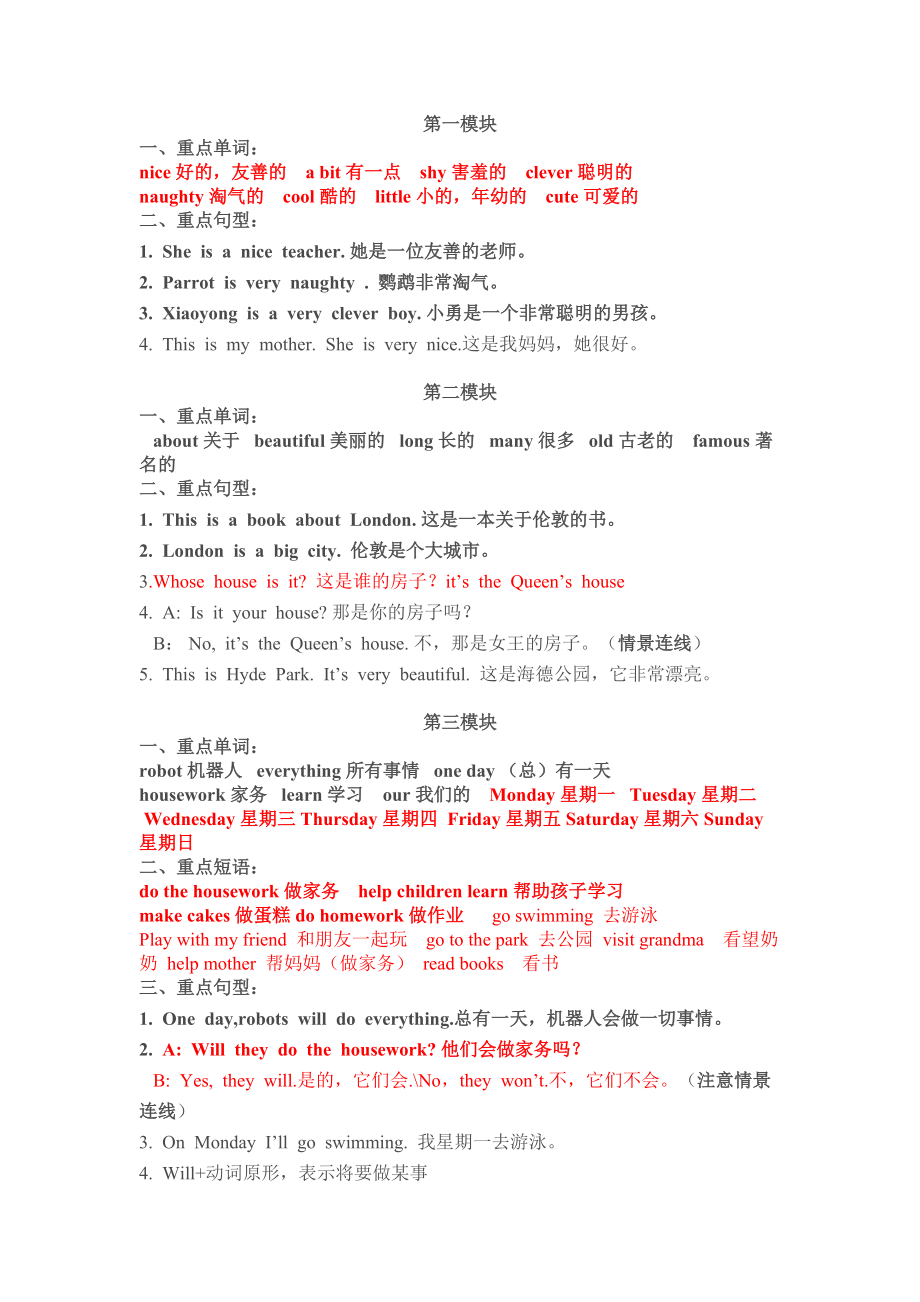《外研社三起點(diǎn)四年級(jí)下冊(cè)英語(yǔ)期末復(fù)習(xí)重點(diǎn)短語(yǔ)-句子》由會(huì)員分享���,可在線閱讀����,更多相關(guān)《外研社三起點(diǎn)四年級(jí)下冊(cè)英語(yǔ)期末復(fù)習(xí)重點(diǎn)短語(yǔ)-句子(5頁(yè)珍藏版)》請(qǐng)?jiān)谘b配圖網(wǎng)上搜索�����。
1、第一模塊
一����、重點(diǎn)單詞:
nice好的�,友善的a bit有一點(diǎn)shy害羞的clever聰明的
naughty淘氣的cool酷的little小的,年幼的cute可愛的
二��、重點(diǎn)句型:
1. She is a nice teacher.她是一位友善的老師�����。
2. Parrot is very naughty . 鸚鵡非常淘氣�����。
3. Xiaoyong is a very clever boy.小勇是一個(gè)非常聰明的男孩�����。
4. This is my mother. She is very nice.這是我媽媽,她很好�����。
第二模塊
一����、重點(diǎn)單詞:
about關(guān)于beautif
2����、ul美麗的long長(zhǎng)的many很多old古老的famous著名的
二�、重點(diǎn)句型:
1. This is a book about London.這是一本關(guān)于倫敦的書�。
2. London is a big city. 倫敦是個(gè)大城市。
3.Whose house is it? 這是誰(shuí)的房子��?it’s the Queen’s house
4. A: Is it your house?那是你的房子嗎�����?
B:No, it’s the Queen’s house.不���,那是女王的房子����。(情景連線)
5. This is Hyde Park. It’s very beautiful. 這是海
3、德公園��,它非常漂亮���。
第三模塊
一�、重點(diǎn)單詞:
robot機(jī)器人everything所有事情one day(總)有一天
housework家務(wù)learn學(xué)習(xí)our我們的Monday星期一Tuesday星期二Wednesday星期三Thursday星期四Friday星期五Saturday星期六Sunday星期日
二��、重點(diǎn)短語(yǔ):
do the housework做家務(wù)help children learn幫助孩子學(xué)習(xí)
make cakes做蛋糕do homework做作業(yè)go swimming 去游泳
Play with my friend 和朋友一起玩 go to the
4����、 park 去公園 visit grandma 看望奶奶 help mother 幫媽媽(做家務(wù)) read books 看書
三、重點(diǎn)句型:
1. One day,robots will do everything.總有一天���,機(jī)器人會(huì)做一切事情�����。
2. A: Will they do the housework?他們會(huì)做家務(wù)嗎����?
B: Yes, they will.是的��,它們會(huì).\No�����,they won’t.不���,它們不會(huì)�。(注意情景連線)
3. On Monday I’ll go swimming. 我星期一去游泳��。
4. Will+動(dòng)詞原形���,表示將要做某事
5����、
第四模塊
一�、重點(diǎn)單詞:
take帶,拿走picnic野餐great太好了why為什么because因?yàn)閟o所以
二����、重點(diǎn)短語(yǔ):
on Saturday在周六have a picnic野餐next week下周play football踢足球
rain (be)sunny(be)windy(be) coldsnow (be) cloudy
下雨 晴朗的有風(fēng)的寒冷的 下雪 多云的
三、重點(diǎn)句型:
1. A: Will you take your kite tomorrow?明天你帶著你的風(fēng)箏嗎�?
B: Yes, I
6、 will.\ No, I won’t.是的�,我會(huì)。\不�����,我不會(huì)。(注意情連)
2. On Saturday we’re going to have a picnic.星期六我們要去野餐�����。
3. A:Whynot?為什么不呢�����?B:Becausetomorrow is Friday.因?yàn)槊魈焓侵芪濉?
4. A: What will Shanshan do on Monday?姍姍星期一要干什么����?
B: On Monday she’ll play with her friend,
5. A:Will it be windy in Beijing?北京會(huì)有風(fēng)嗎�?
B:Yes, it wi
7、ll.是的�,會(huì).\No, it won’t.不,不會(huì)�����。(注意情景連線)
6.be going to =will 后面加動(dòng)詞原形�,表示將要做某事
第五模塊
一、重點(diǎn)單詞:
old年長(zhǎng)的young年輕的strong強(qiáng)壯的 clean干凈的 dirty 臟的
2、 反義詞:
old — young short—tall��, long clean— dirty fat — thin
老的 年輕的 短的�,矮的/高的,長(zhǎng)的 干凈的 臟的 胖的 瘦的
三�、重點(diǎn)句型:
1.I was two then. 我那時(shí)候2歲。
2.Wh
8�、o is that little girl��?那個(gè)小女孩是誰(shuí)�����?
3.They were young then. 他們那時(shí)候很年輕�。
4.It wasn’t clean then.It is clean now。它之前很不干凈���,它現(xiàn)在很干凈
第六模塊
1����、 重點(diǎn)單詞:
Very well 非常好 yesterday昨天 lesson 一節(jié)課
was(否定形式)wasn’t were(否定形式)weren’t
三�����、重點(diǎn)句型:
1. Were you at home yesterday? 你昨天在家嗎?
2.Was it sunny in London yesterday
9、? 倫敦昨天是晴天嗎��?
Yes,it was. / No it wasn’t.
3.Was it a big city then? 它過去是個(gè)大城市嗎�����?
4.It was a very small village then.它過去是個(gè)小村莊�����。
第七模塊
1����、 重點(diǎn)單詞:
二、重點(diǎn)短語(yǔ):row a boat 劃船 play on the computer 玩電腦 cook noodles煮面條 listen to the music 聽音樂 wash clothes洗衣服
三�、重點(diǎn)句型:
1. I cooked noodles yesterday.我昨天煮面條
10、了��。
2. He played on the computer and watched TV. 他玩電腦和看電視���。
3. I phoned grandma yesterday.我昨天給奶奶打電話了�����。
第八模塊
一�����、重點(diǎn)單詞:
beautifully 優(yōu)美地����,動(dòng)聽地 game游戲,比賽 have a good time玩得開心
busy 忙的
2����、 重點(diǎn)短語(yǔ):go swimming去游泳 do my homework 做我的家庭作業(yè)
go to the supermarket去超市
三、重點(diǎn)句型:
1. They sang b
11�、eautifully. 它們唱得很動(dòng)聽�����。
2.You had a good time! 你玩得真開心����!
3.We walked in the park,we listened to the music,we sang and danced.
我們?cè)诠珗@里散步,聽音樂��,我們又唱又跳�����。
4. I took some pictures. 我拍了一些照片。
5. Amy went to school by bike.艾米騎自行車去學(xué)校��。
第九模塊
一��、重點(diǎn)單詞:
Welcome歡迎 cousin 表堂兄弟(姐妹) on holiday 在休假 travel去旅游 come
12�、(came)來(lái) pop concert 流行音樂會(huì)
2、 重點(diǎn)短語(yǔ):last week上周 last year 去年 travel by plane乘飛機(jī)去旅行
go to a pop concert去聽流行音樂會(huì)
三.重點(diǎn)句子:
1.Did he live in New York last year? 他去年住在紐約嗎�?
(Did是照妖鏡,后面動(dòng)詞現(xiàn)原形)
Yes,he did./No,he didn’t.
2. Does he live in New York ?他現(xiàn)在住在紐約嗎�?
Yes,he does./No,he d
13、oesn’t.
3. Did you have a nice holiday? 你假期玩得開心嗎���?
Yes,I did./No,I didn’t.
4. Did you go to Hong Kong last year?你去年去香港了嗎��?
5.She was on holiday in Shanghai. 她那時(shí)候在上海度假呢�。
第十模塊
一���、重點(diǎn)單詞:
happen發(fā)生 ride騎����,乘 then然后 thirsty口渴 carry攜帶����,運(yùn)送
fever發(fā)燒have acold感冒bump磕����、碰 stomachache胃疼
headache頭疼 waterm
14�、elon西瓜
二、重點(diǎn)知識(shí)點(diǎn):
a bike ride騎自行車 lots of許多 have吃���,患(過去式) had
fall off跌落(過去式) fell off go去(過去式) wentbuy買(過去式) bought
have got a fever\cold\headache患了發(fā)燒\感冒\頭疼
動(dòng)詞過去式變化規(guī)則:
1. 直接加ed cook -cooked煮東西 wash -washed洗東西 play-played玩watch-watched看 listen -listened聽 talk-talked說(shuō) jump-jum
15�����、ped跳
2. 以e結(jié)尾的加d, phone-phoned打電話 dance-danced 跳舞 live-lived居住
3. 雙寫最后的字母加ed, stop-stopped停止 travel- travelled旅行
4,特殊形式���。
have-had 度過,有 do -did做 am/is-wasare-were sing-sang 唱歌 see-saw看見 go-went去 eat-ate 吃 drink-drank喝 tell -told 告訴
see---saw看見 take---took拍攝 make---made制作 come-came來(lái)
 外研社三起點(diǎn)四年級(jí)下冊(cè)英語(yǔ)期末復(fù)習(xí)重點(diǎn)短語(yǔ)-句子
外研社三起點(diǎn)四年級(jí)下冊(cè)英語(yǔ)期末復(fù)習(xí)重點(diǎn)短語(yǔ)-句子

